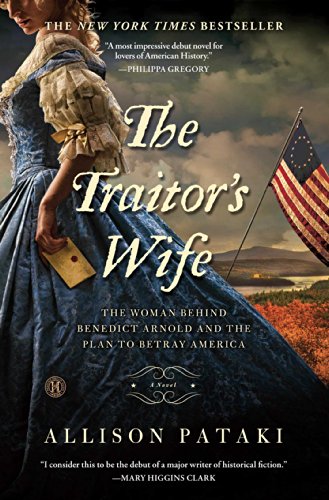For Readers & Book Clubs

The Traitor’s Wife
TOPICS AND QUESTIONS FOR DISCUSSION
Introduction: When turncoat Benedict Arnold aided the British during the Revolutionary War, he wasn’t acting alone. Orchestrating the espionage was his spouse, the beautiful socialite Peggy Shippen, whose treachery nearly cost the fledgling nation its fight for freedom. In The Traitor’s Wife, Allison Pataki brings to life an intriguing slice of American history, told from the perspective of Peggy’s lady’s maid, Clara Bell, who must decide where her own loyalties lie.
- Before moving to Philadelphia, Clara spent her entire life on a farm in the Pennsylvania countryside. How does Clara’s identity evolve throughout her years of service to Peggy and Benedict Arnold? What character traits does Clara retain? Discuss which characters have the greatest impact on Clara’s growth and development.
- Why does Clara take a nearly instant dislike to Major John André? Why is she relieved when Judge and Mrs. Shippen refuse to allow Peggy to attend the Meshianza Masque? Compare the way André treats Peggy with how Caleb treats Clara.
- Clara is flattered at “having so quickly become her lady’s confidante and friend” (page 108). Does Peggy sincerely consider Clara a friend, or is Clara misreading her mistress? Why does Clara so desperately crave Peggy’s approval, and even friendship? At what point does this begin to shift?
- Discuss the theme of loyalty in the novel. What drives the different characters’ allegiances? Who is the most loyal character?
- “I hate the man, and I always will,” says Peggy of Benedict Arnold (page 135). Why then does she begin pursuing him the first time they meet? Does she truly come to care about him, or is it all an act?
- What is your view of Benedict Arnold? Trace his evolution from ardent patriot to turncoat. Do you think he would have committed treason without Peggy’s influence? Why or why not? Discuss both his and Peggy’s motivations for aiding the British.
- “My husband knows how to win on the battlefield. It’s all brute strength and fighting. But spy work is different—it requires poise, and self-control, and grace. It’s like a delicate dance. And if anyone knows how to dance, it’s me,” says Peggy (page 303). Which traits make Peggy better suited for espionage than Arnold? Why does the couple freely discuss their plans in front of Clara? Is it because they trust her not to reveal their secrets or, as Clara believes, because they find her invisible?
- When Arnold’s treachery is revealed, he immediately flees and leaves Peggy behind. Given the circumstances, are his actions justifiable in any way? Why doesn’t Peggy hold it against him? Share whether or not you were surprised that Peggy was able to so easily convince George Washington and his companions of her innocence.
- Does Clara intentionally or unintentionally help the Arnolds commit treason by cracking André’s code and translating the clandestine correspondence? Does her role make Clara partly to blame? What would you have done if you were in her position?
- At one point in the story, Clara laments that she is not the master of her own fate. How do she and Caleb take charge of their future, both individually and as a couple? Discuss Clara’s warring emotions of impotency and desperation to intervene in the Arnolds’ plot.
- When Clara confides in Mrs. Quigley about the Arnolds’ plotting, why is the older woman so quick to dismiss her claims? When Mrs. Quigley later understands exactly what’s happening, why does she still advise against Clara and Caleb taking action to stop the Arnolds? Explore how Mrs. Quigley’s response to the news differs from Caleb’s response to the news. Does either of them understand Clara’s position and perspective?
- Examine the character of George Washington. Why does the novel open on the morning of his visit? What does George Washington mean to Benedict Arnold? To Peggy Arnold? To the servants like Hannah, Caleb, Clara, or the Quigleys? Discuss whether George Washington’s disapproval was the impetus for Arnold to agree to treason.
- How does Clara use tactics she learned from observing her mistress to achieve her freedom from Peggy? What gives Clara the strength and courage to stand up to the imposing Peggy? Would Clara actually have reported Peggy’s guilt, or was it a bluff?
- When news comes that Arnold successfully escaped, why is Clara relieved he won’t hang for his crimes? Why does she promise to keep quiet about Peggy’s role in the plot?
- In what ways did The Traitor’s Wife give you new insights into the Revolutionary War? What, if anything, did you learn that surprised you?
